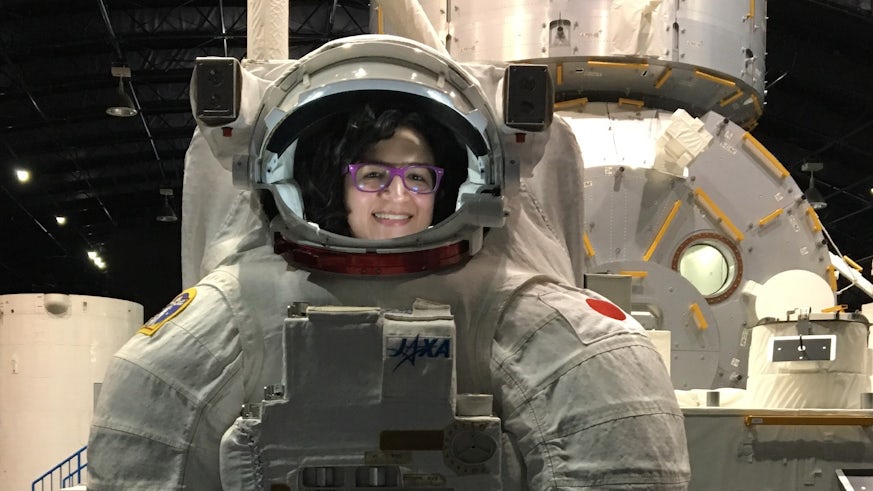The International Space Station goes under the microscope
29 May 2018

A Cardiff University academic has spent two years embedded with the teams working on the International Space Station (ISS) programme to compile the most comprehensive study of its work.
Dr Paola Castaño, of the School of Social Sciences, is a Newton International Fellow funded by The Royal Society, The British Academy and the Academy of Medical Sciences. She has travelled the world investigating every aspect of the orbiting laboratory, researching the people and processes behind it.
Located 254 miles above the Earth’s atmosphere, the ISS is inhabited by astronauts from Europe, the United States, Canada, Japan and Russia, working on hundreds of experiments in biology, physics, medicine, materials science, education and technology.
Dr Castaño has focused on a group of experiments on human health (a study of twin astronauts in the field of genomics and other studies of physiological deconditioning in response to the space conditions), plant biology (comparing US and Russian plant growth studies), and the study of particles in the Universe (NASA’s Alpha Magnetic Spectrometer and JAXA’s Calorimetric Electron Telescope), researching how they are executed and evaluated at every stage of the process.
Next to examining the actual processes of conducting the tests, Dr Castaño is interested in how science on the ISS is evaluated. She said: “Since it became fully operational in 2010, the ISS has certainly enabled hundreds of experiments across disciplines, but the question of whether it has fulfilled its scientific ambitions remains contentious.
“As the most expensive effort to put humans in space, the ISS must respond to diverse and often competing interests and criteria of evaluation – ranging from the most political to the most technical. These cover aspects ranging in terms of international cooperation, commercial development, public support, educational inspiration, technological advancement, and, of course, scientific research.
“Additionally, space agencies commission independent studies to measure the ‘research performance’ of the ISS and justify the science to diverse audiences, with reference to ‘real world benefits’ and to its enabling role for sending humans beyond Low Earth Orbit in the next decades.
“In all of these settings, enthusiasts and critics – with varied types of involvements, ideas and qualifications – selectively highlight aspects of the broad portfolio of experiments to make their case.
“My work will provide a framework to understand how experiments are assessed in terms of success or failure by scientists, political stakeholders and the media.”
She added: “The ISS is a microcosm of contemporary science. It is a unique setting from which to analyse how science as a whole is evaluated by different social institutions.”
In collecting her research, Dr Castaño has become a familiar face at NASA, the Smithsonian Institution in Washington, Freie Universität Berlin in Germany, and Waseda University in Japan. She has carried out 87 interviews, which include astronauts, scientists, technical staff and policy makers.
A highlight of her research process was being present at the Baikonur Cosmodrome in Kazakhstan in the days leading up to the launch of the Soyuz rocket MS-03 carrying Russian cosmonaut Oleg Novitskiy, American astronaut Peggy Whitson and French astronaut Thomas Pesquet to the ISS.
As well as writing a book on her research, Dr Castaño aims to present relevant findings of her work to the UK Space Agency.
She said: “The recent expedition of the first UK/ESA astronaut to the ISS, Tim Peake, launched an unprecedented set of science education initiatives in the UK.
“The 2015 National Space Policy and the 2017 launch of a £10 million scheme of incentives to develop a commercial spaceflight market, pose a unique opportunity to discuss the role of science in the efforts to expand the UK space sector.”
She added: “From a very young age, I have been fascinated by the possibilities and potential of space exploration. It has been a real privilege getting to know the people who work on the ISS and through them, to gain deep and unique insights about the workings of scientific knowledge.”




